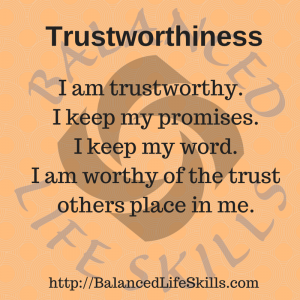 You cannot trust anyone that cheats or steals. If you have ever had an item stolen from you or been cheated on, you know that feeling of violation, loss of trust and edginess that follows. However my discussions this week with our students have included another aspect of trustworthiness when it comes to these trust breaking practices.
You cannot trust anyone that cheats or steals. If you have ever had an item stolen from you or been cheated on, you know that feeling of violation, loss of trust and edginess that follows. However my discussions this week with our students have included another aspect of trustworthiness when it comes to these trust breaking practices.
What would you do if someone asked you to take part in cheating or stealing? How would you respond if someone asked you or demanded that you let them copy your homework so they could turn it in?
The immediate response from all students was a resounding NO, I would not let them do that. I would help them with their work or do it together with them or suggest that they get a note from their parents – but I would never just give them my work – that would be cheating.
The next question though was more difficult. What would you do if it was your best friend that asked you to let them use your homework. This changed the situation. It added in the possibility of losing a best friend. While the response was the same as previously, it did not come as quickly, as they thought deeply about all the possibilities.
When it comes to cheating and stealing, if we want to make a decision we will be proud of and happy that we did the right thing, we must prepare. Think about the situation and make up your mind ahead of time that you will say NO. Think of what you could do or say, “I will do it kindly and make suggestions of how to deal with the problem of not having done the homework – but I will not allow someone else, even a close friend, to copy my work and turn it in as their own.”
